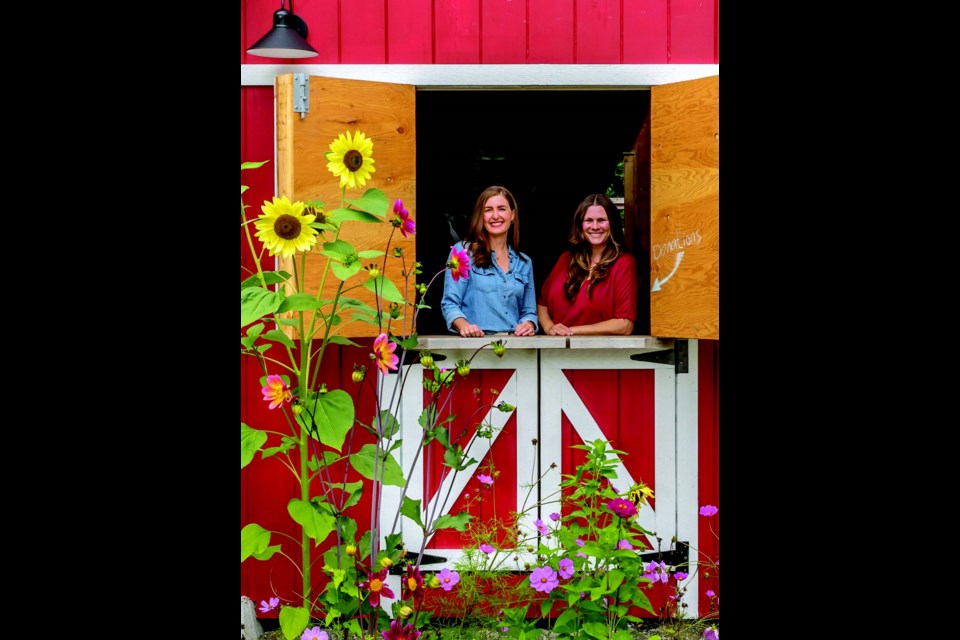From its grassroots beginnings in the 1990s to its abundant projects of today, the One Straw Society has grown faster than your prize zucchini that sprouted two more inches one sunny afternoon.
“It’s been a meteoric rise,” said Casandra Fletcher, executive director of the organization. If you were to join One Straw Society, you might find yourself meeting local farmers, tending roadside plots, donating garden and kitchen tools, learning at workshops or making soup. One Straw’s current projects all have two things in common: they foster locally grown food, and they build our community. Today, a team of 18 work with the society— some are paid a full living wage for their
job while others, known as “knowledge-philanthropists,” are paid by stipend, just enough to keep the organization going. They work alongside hundreds of volunteers to sustain the many projects.
A few years ago One Straw had almost folded, stunned by the loss of its founder, farmer and activist Robin Wheeler. It needed to regroup and rally around the common cause. It also needed the development of a framework for members to move forward, said Casandra, who has a background in strategic planning.
In 2020, spurred on by concerns of food security because of the pandemic, members cleared weeds and turned earth behind the Gumboot Restaurant in Roberts Creek to plant the Tiny Farm, as it is called. It also had the benefit of becoming a safe outdoor space during the pandemic and has since been enhanced with picnic tables and containers for water storage. The garden was flourishing with vegetables and flowers in August—one section was set aside for children and another section for Our Mothers’ Herbal Medicine Garden.
A Tool Lending Library is the latest addition to One Straw’s projects. It opened in July to offer a variety of tools, from pruners and water pumps to canners and apple presses, that can be borrowed from the little red barn that sits at Tiny Farm.
The library is open to the community, but you must become a member to browse the inventory online and reserve for the day you need to borrow that big, awkward tool that you can’t afford to buy or store for yourself. You’ll be given a code to open the barn door and can log in when inside. Others can help you learn how to use the equipment. Just like any other lending library, there will be late fees if you can’t return it on time.
Already the tiny barn is being stretched to capacity and One Straw hopes to have separate buildings in the future: one for farm/garden tools and one for kitchen food preservation tools.
One of the most successful projects is the Crop Circle Food Box program. It gives support for local agriculture plus it provides nutritious local produce. Farmers are prepaid early in the year to give them the upfront money to plant seeds and develop infrastructure. They do their planning together to plant a wide variety of produce. The paying customer—that’s you—is provided with a box of fresh groceries each week.
About a quarter of the food box program is subsidized for those who require it, and the recipients remain anonymous with their dignity intact.
“They receive fresh local abundance each week,” said Casandra, “so that they can put energy into their own needs or healing.”
The need has been greater lately, said Jillian Wybrow, a summer student directing the Food Box program. It’s about food security, she points out, and delivering better nutrition with no waste.
In addition to her job, Jillian was volunteering to serve tables at another One Straw project, the popular “Tiny Farm, Big Table” dinners served al fresco on certain dates in summer. The seven-course meal uses local products and local chefs who whip up such delights as curried carrot soup, focaccia bread, fresh salad, roasted cauliflower, tender pork, and a light, sweet cake with berry topping for dessert. The cost of the meal for the sixty diners who sat down in July provides ongoing funding for the organization.
Other projects don’t always bring in much funding but are equally rewarding, for example, the Streetside Garden that can be found on Ocean Street in Sechelt. Jesse Frank, a One Straw team member, looks after it. Rows of strawberries grow alongside squash, tomatoes and herbs in a lengthy strip by the side of the road. Anyone who wishes can pick something for their own dinner at no cost. It’s an altruistic gesture, Casandra notes, and a challenge to find volunteers who will stick with its maintenance, as they might put energy into growing a crop then find that it’s been harvested by someone else.
When the gardens wind down in the fall, One Straw doesn’t stop. It’s time for Soup Stories, running from November to February at different Coast locations. Crews of cooks—from teens to elders—come together to make a big pot of soup which is served free or by donation to the community. In return the happy diners provide input on food security and environmental issues to One Straw organizers.
“It’s called food for thought,” said Casandra, laughing. Find out more or join One Straw at www.onestraw.ca.



